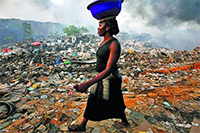Exposed: Scotlandís toxic waste is poisoning Africa and Asia
by Rob Edwards, Sunday Herald
 |
 |
 |
 |
| |
 |
|
| |
A 'tsunami' of old TVs is being exported |
|
 |
 |
 |
|
| |
26 September 2010 – Tens of thousands of tonnes of toxic waste from Scotland are being illegally dumped in Africa and Asia every year with the help of organised criminal gangs, according to an investigation by the Scottish Government’s environmental watchdog.
Mountains of broken televisions, defunct microwaves, worn tyres, contaminated paper and other waste exported from Scottish homes and businesses end up threatening the environment and endangering the health of people in Nigeria, Zanzibar, Ghana, Indonesia, Pakistan, China and elsewhere.
But now the Scottish Environment Protection Agency (Sepa) is cracking down on the criminal trade, and has stopped eight major shipments this year. Four other illegal waste cargoes from Scotland have been intercepted by regulatory agencies in England, The Netherlands and Belgium since 2008.
Using a combination of intelligence, surprise checks at ports, and unannounced inspections of waste firms, Sepa has started to uncover a network of companies and individuals who try to make money from exporting waste.
Sometimes the exports are “dressed” as legitimate recycling operations, with waste electrical goods hidden behind a few rows of properly packaged and working TVs in shipping containers.
“It can be a sham recovery operation,” said Patrick McKell, who manages international waste shipments for Sepa. “This is about ensuring that Scottish waste isn’t dumped on developing nations which have insufficient facilities to deal with it.”
McKell pointed out that many of the wastes contained hazardous chemicals and metals which needed to be properly disposed of. But in developing countries, they were just dumped or burned, causing dangerous contamination.
“Sepa has suspicions that organised crime may be facilitating some of the activities, and we have been in touch with the police about this,” he told the Sunday Herald. There were a “significant number of non-UK nationals” involved who could make thousands of pounds from exporting, extracting and reselling materials from the waste, he said.
But McKell accepted there was a long way to go before the illegal trade was stamped out. Intelligence estimates suggest that there were up to 20,000 tonnes of waste electrical goods from the west of Scotland “leaking” from legitimate recycling operations each year, he said.
More than 100,000 tonnes of old TVs, computers, microwaves, fridges and other electrical goods are reckoned to be thrown away every year in Scotland. European Commission estimates suggest maybe half of that is unaccounted for.
Sepa began its crackdown on illegal waste exports this year as part of an international effort to combat the crime. In February, it signed an agreement to work with regulatory agencies in The Netherlands, Northern Ireland, and England and Wales.
Of the 12 Scottish shipments intercepted in the last couple of years, only one is known to be subject to a pending prosecution. But in the other cases, operators had to incur the costs of the waste being intercepted and stored.
The huge trade in illegal waste has been condemned by environmental groups which are demanding tougher penalties. Duncan McLaren, chief executive of Friends of the Earth Scotland, said: “We are adding insult to injury by dumping our contaminated and toxic waste back in the very countries, like Nigeria, that have already been scarred so deeply by our thirst for cheap oil and resources.”
“Sepa needs the additional resources and powers to close down this dirty trade at source, and to properly enforce producer responsibility laws. That means changes in our legal system to ensure that offenders can be brought to book and then face substantial penalties and, if necessary, imprisonment.”
According to Jim Puckett from the global waste campaign group the Basel Action Network, hazardous waste was “haemorrhaging” out of Europe. “The crackdown by the Scottish authorities is laudable but these unscrupulous traders will not be deterred with just a slap on the wrist,” he said.
“The Basel Convention, which all of the European Union has ratified, requires authorities to treat illegal traffic in waste as a criminal offence. Unless the perpetrators are given jail sentences they will simply pay the fines from past or future profits and start up business again under a different name.”
Recent changes like the switch from analogue to digital displays and flat screens had created a “tsunami of old TVs and computer monitors flooding ports in Asia, Ghana and Nigeria”, Puckett said. There they are often recycled in primitive and environmentally damaging conditions or simply dumped or burned if there is no market for it.
The Basel Action Network has set up a certification system for recycling companies which refuse to export electronic waste to developing countries. Known as “e-Stewards”, it certified its first UK company, in Surrey, last week.
FAIR USE NOTICE. This document contains copyrighted material whose use has not been specifically authorized by the copyright owner. The Basel Action Network is making this article available in our efforts to advance understanding of ecological sustainability and environmental justice issues. We believe that this constitutes a 'fair use' of the copyrighted material as provided for in section 107 of the US Copyright Law. If you wish to use this copyrighted material for purposes of your own that go beyond 'fair use', you must obtain permission from the copyright owner.
More News
|